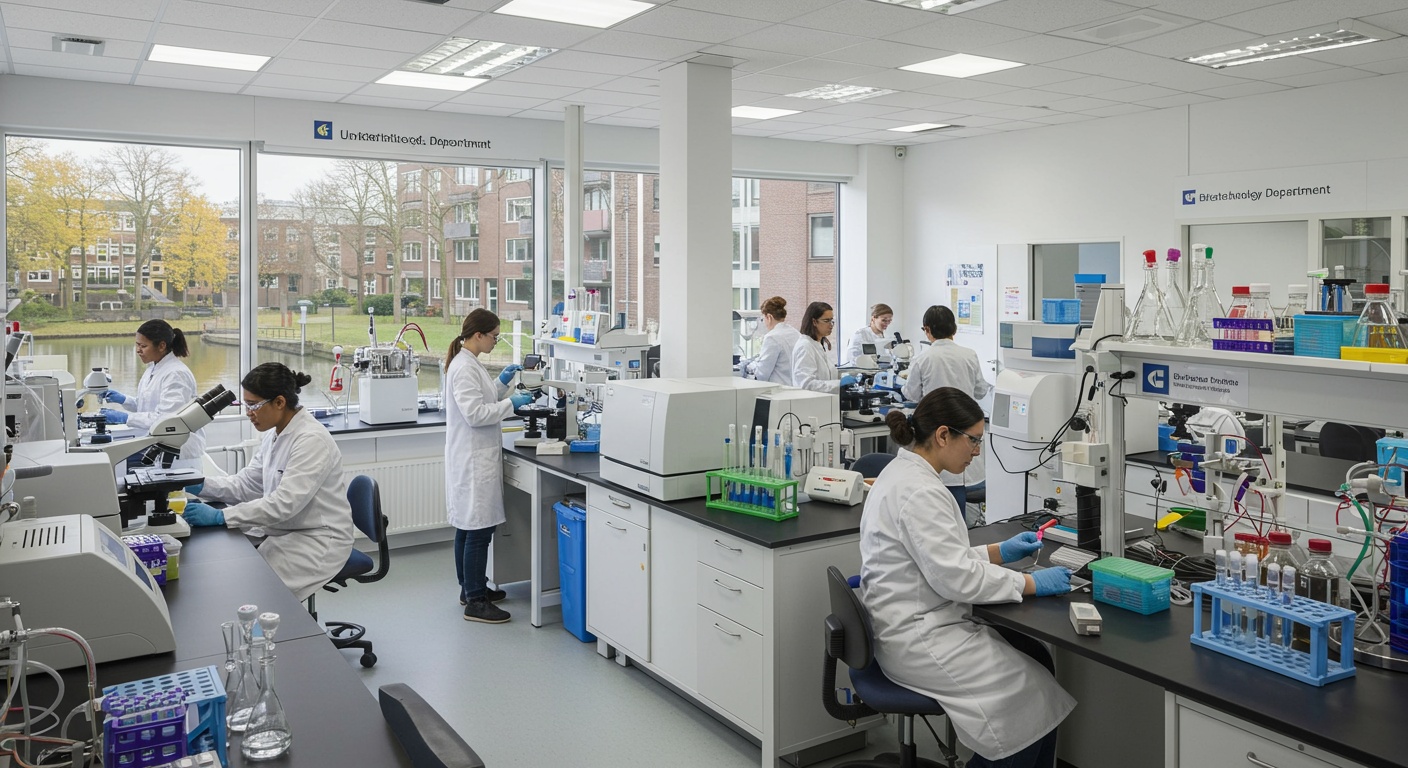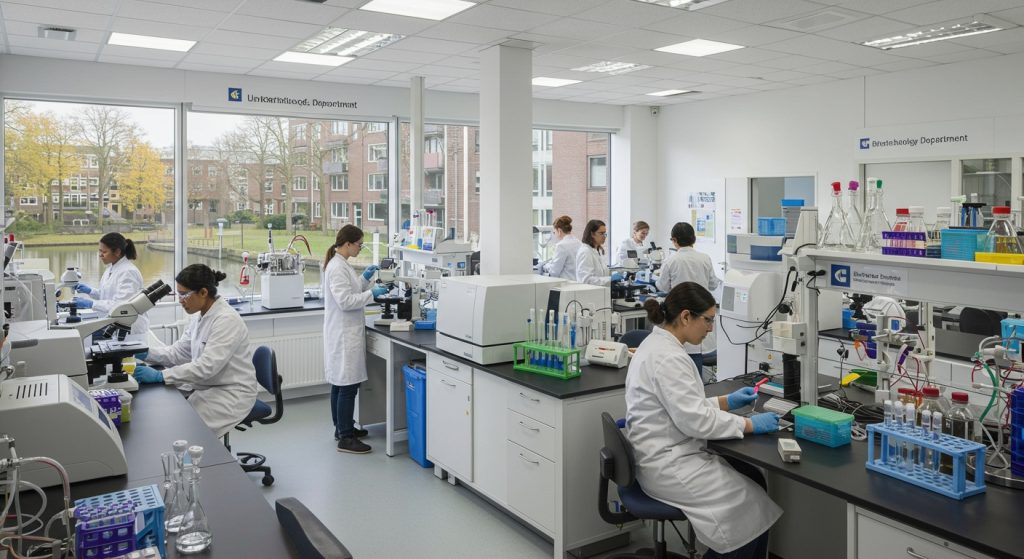The Netherlands is rapidly becoming a European biotechnology powerhouse, fueled by cutting-edge research and strategic government investment. This growth is creating a high demand for skilled professionals, driving prospective students to seek top-tier educational opportunities. But where do aspiring biotechnologists find the most impactful training? This exploration delves into the leading institutions across the Netherlands shaping the future of this field, from Wageningen University & Research’s focus on agri-food and biosciences to the technical prowess cultivated at Delft University of Technology and the biomedical emphasis at Leiden University. We will navigate the unique strengths of each program, highlighting their specializations, research opportunities. Industry connections, empowering future students to choose the path best suited to their ambitions in this dynamic sector.

Understanding Biotechnology: A Foundation
Biotechnology, at its core, leverages biological systems, living organisms, or parts thereof to develop or create different products. Think of it as harnessing the power of nature’s machinery to solve problems in medicine, agriculture, industry. The environment. It’s a multidisciplinary field, drawing from biology, chemistry, engineering. Computer science.
Key technologies within biotechnology include:
- Genetic Engineering: Modifying an organism’s genes to introduce desired traits. This could involve adding, deleting, or altering specific DNA sequences.
- Cell Culture: Growing cells in a controlled environment outside their natural context. This is crucial for producing proteins, antibodies. Even artificial tissues.
- Recombinant DNA Technology: Combining DNA from different sources to create new genetic combinations. A classic example is producing insulin in bacteria.
- Bioprocessing: Using living cells or their components to produce valuable substances on a large scale. This is common in the pharmaceutical and food industries.
- Bioinformatics: Using computational tools to examine biological data, such as DNA sequences and protein structures. This is essential for understanding complex biological systems.
Delft University of Technology (TU Delft)
TU Delft consistently ranks among the world’s top engineering and technology universities. Its biotechnology programs are renowned for their strong focus on engineering principles and their application to biological systems.
Key Features of Biotechnology at TU Delft:
- Focus on Bioprocess Engineering: TU Delft excels in the design and optimization of bioprocesses, particularly for industrial applications.
- Systems Biology Approach: Their research often involves a holistic approach, considering the interactions between different components within a biological system.
- State-of-the-Art Facilities: Students have access to advanced equipment for cell culture, fermentation. Bioprocess analysis.
- Strong Industry Collaboration: TU Delft maintains close ties with biotech companies, providing students with opportunities for internships and research projects.
An example of their real-world application is the development of sustainable bioprocesses for producing biofuels and bioplastics, addressing the need for alternatives to fossil fuels.
Wageningen University & Research (WUR)
Wageningen University & Research is globally recognized for its expertise in agriculture, food. Environmental sciences. Its biotechnology programs are naturally aligned with these strengths, focusing on applications in these areas.
Key Features of Biotechnology at WUR:
- Emphasis on Plant and Microbial Biotechnology: WUR is a leader in research related to genetically modified crops, plant disease resistance. Microbial fermentation.
- Sustainable Food Production: A significant focus is on developing biotechnological solutions for improving food security and reducing the environmental impact of agriculture.
- Environmental Biotechnology: WUR also conducts research on using biotechnology to clean up polluted environments and develop sustainable waste management practices.
- Interdisciplinary Approach: Biotechnology programs at WUR often involve collaborations between researchers from different disciplines, such as biology, chemistry. Agricultural science.
WUR’s research on developing disease-resistant crops through genetic engineering is a prime example of a real-world application. This helps farmers reduce their reliance on pesticides and improve crop yields.
Did you know you can also find top Biotechnology universities in Germany? Read about it here!
University of Amsterdam (UvA)
The University of Amsterdam offers a strong biotechnology program with a focus on fundamental research and its translation into practical applications, particularly in the medical field.
Key Features of Biotechnology at UvA:
- Focus on Medical Biotechnology: UvA’s biotechnology programs often emphasize the development of new therapies for diseases, including cancer and infectious diseases.
- Molecular Biology and Genetics: A strong foundation in molecular biology and genetics is provided, allowing students to interpret the underlying mechanisms of biological processes.
- Drug Discovery and Development: Research at UvA often focuses on identifying new drug targets and developing novel therapeutic strategies.
- Collaboration with the Amsterdam UMC: UvA has close ties with the Amsterdam University Medical Centers (Amsterdam UMC), providing students with access to clinical research opportunities.
The development of new antibody-based therapies for cancer is an area where UvA is actively involved, showcasing the real-world impact of their research.
Leiden University
Leiden University is known for its strong life sciences programs, including biotechnology. Their programs often emphasize the fundamental understanding of biological processes and their application to human health.
Key Features of Biotechnology at Leiden University:
- Focus on Drug Development and Personalized Medicine: Leiden emphasizes translating basic research into new drugs and diagnostics, tailored to individual patient needs.
- Strong Emphasis on Fundamental Research: The programs provide a solid grounding in molecular biology, cell biology. Genetics.
- Bioinformatics and Data Analysis: With the increasing volume of biological data, Leiden also emphasizes the use of bioinformatics tools for data analysis and interpretation.
- Collaboration with the Leiden Bio Science Park: Located in the heart of the Leiden Bio Science Park, the university has strong ties with biotech companies and research institutions.
Leiden University’s research into developing personalized cancer therapies based on a patient’s genetic profile exemplifies their focus on translating research into real-world applications.
Comparing the Institutions: A Summary
| Institution | Focus Area | Key Strengths | Potential Career Paths |
|---|---|---|---|
| TU Delft | Bioprocess Engineering | Industrial biotechnology, systems biology, bioprocess optimization | Bioprocess engineer, research scientist, process development specialist |
| Wageningen University & Research | Agricultural and Environmental Biotechnology | Plant biotechnology, microbial biotechnology, sustainable food production | Plant breeder, agricultural scientist, environmental consultant |
| University of Amsterdam | Medical Biotechnology | Drug discovery, molecular biology, genetics, clinical research | Research scientist, drug developer, clinical trial manager |
| Leiden University | Drug Development and Personalized Medicine | Molecular biology, cell biology, bioinformatics, translational research | Research scientist, drug developer, bioinformatics specialist |
Choosing the Right Institution for You
The “best” institution depends entirely on your individual interests and career goals. Consider the following when making your decision:
- Your specific area of interest: Are you more interested in industrial biotechnology, agricultural biotechnology, or medical biotechnology?
- The program’s curriculum: Does the curriculum cover the topics that are most vital to you?
- Research opportunities: Does the institution offer opportunities to participate in cutting-edge research?
- Industry connections: Does the institution have strong ties with biotech companies and research institutions?
- Location and campus culture: Do you feel comfortable with the location and campus culture of the institution?
Conclusion
The landscape of biotechnology education in the Netherlands is vibrant, offering diverse pathways for aspiring scientists and innovators. As we look to the future, these institutions are poised to play a critical role in addressing global challenges, from developing sustainable agriculture solutions to pioneering personalized medicine. The key to success lies in embracing interdisciplinary approaches, fostering strong industry collaborations. Nurturing entrepreneurial mindsets within students. The road ahead demands a commitment to continuous learning and adaptation. Consider supplementing your formal education with hands-on experiences like internships. Actively seek out mentorship from seasoned professionals in the field. Remember, the biotechnology sector is constantly evolving. Staying informed about the latest advancements is essential. The Netherlands is actively fostering a biotech ecosystem. Your contributions can be instrumental in driving innovation and creating a healthier, more sustainable future. Embrace the challenge, stay curious. Be prepared to make a meaningful impact.
FAQs
So, which Dutch universities are really killing it in the biotech field?
Okay, so you want the big players, right? Delft University of Technology (TU Delft) is a powerhouse, especially when it comes to bioprocess engineering and synthetic biology. Wageningen University & Research (WUR) is THE place for agricultural and food biotechnology. Then you’ve got Leiden University, strong in areas like drug discovery and bioinformatics related to biotechnology.
Are there any universities besides those big three that offer solid biotech programs?
Absolutely! The University of Groningen has a strong focus on medical biotechnology and offers some unique programs. The University of Amsterdam (UvA) and VU Amsterdam also have relevant programs, particularly in areas like molecular biology and biomedical sciences that are closely tied to biotech. Don’t discount them!
What kind of degrees are we talking about here? Just Masters, or are there Bachelor’s options too?
Good question! You’ll find Bachelor’s programs that are a great stepping stone, often in Biology, Biomedical Sciences, or related fields. But the real biotech specialization tends to kick in at the Master’s level. PhD opportunities are, of course, also available at all these leading institutions.
What makes studying biotech in the Netherlands so appealing, anyway?
Well, the Netherlands has a really strong biotech industry, so you’re not just getting a great education, you’re also plugging into a network of companies and research institutes. Plus, many programs are taught in English, which is super convenient for international students. And let’s be honest, it’s a pretty cool place to live!
Is it all just lectures and lab work, or is there any practical experience involved?
Thankfully, it’s not all lectures! Most programs emphasize practical experience. You’ll likely have lab courses, research projects. Even opportunities for internships at biotech companies. This hands-on experience is invaluable when you’re trying to land a job after graduation.
What should I consider when choosing between these universities?
Think about your specific interests within biotechnology. Are you passionate about agricultural applications? Go for Wageningen. More interested in medical applications? Leiden or Groningen might be a better fit. Also, look at the specific research groups and professors at each university – find someone whose work truly excites you. Finally, consider location and the overall vibe of the university. You want to be happy where you’re studying!
What are the admission requirements generally like?
Generally speaking, you’ll need a relevant Bachelor’s degree for a Master’s program. They’ll also look at your grades. Some programs might have specific course requirements. If English isn’t your first language, you’ll definitely need to prove your proficiency with something like an IELTS or TOEFL score. It’s always best to check the specific requirements for each program you’re interested in though, as they can vary.



